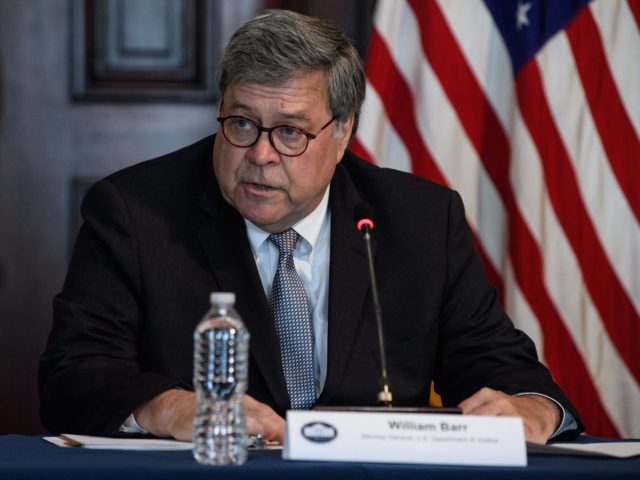The former Archbishop of Philadelphia, Charles J. Chaput, has praised the National Catholic Prayer Breakfast for honoring U.S. Attorney General William Barr, calling him a man with a “moral spine.”
In reaction to the decision to honor AG Barr, Archbishop Chaput said in a September 21 essay: “I have a word to say about that. It’s ‘amen.’”
The archbishop was originally slated to be the keynote speaker for the prayer breakfast but rescheduling due to the coronavirus situation made it impossible for him to deliver his remarks. As a result, they were published Monday in First Things in written form.
“I heard him speak at Notre Dame last October, and I was deeply impressed by two things: the content of his remarks, and the fact that he obviously meant them,” the archbishop said. “Throughout my life, the men and women I’ve most admired have all had the same qualities: a thinking Catholic brain, a character of substance, and a moral spine. General Barr has all three.”
“As an added bonus, he’s disliked by all the right people,” the archbishop wrote. “I want to thank the various and interesting critics of General Barr for confirming me in that judgment.”
Predictably, at the forefront of protests against the Prayer Breakfast’s decision to honor AG Barr was the left-wing National Catholic Reporter, which has regularly advocated positions in direct contradiction to Catholic teaching and only trumpets them when such teachings happen to coincide with the paper’s progressive agenda.
The Association of U.S. Catholic Priests (AUSCP) has also slammed the “scandalous” decision to honor Barr at the annual National Catholic Prayer Breakfast, principally for his reactivation of the federal death penalty.
“The recent decision of the National Catholic Prayer Breakfast (NCPB) to confer its Christifideles Laici award on Attorney General Barr at their September Breakfast is for us shocking, incomprehensible, and scandalous,” declared the AUSCP, which publicly supports Black Lives Matter and crusades against the “climate crisis.”
“Specifically, we consider Mr. Barr’s recent decisions and actions to be abhorrent in the context of Catholic faith,” the statement said. “We consider especially scandalous his decision to begin again federal executions after 17 years of moratorium. Executions are clearly not pro-life.”
The mission of AUSCP involves “raising a prophetic voice” and undertaking “prophetic action,” according to the group’s website.
Another group to criticize the Prayer Breakfast honoree was the anti-capital punishment Catholic Mobilizing Network (CMN).
“It is our hope to make clear that A.G. Barr’s lead role in reinstating the practice of federal executions should preclude him from receiving any award which aims to honor ‘those who serve the church so well,’” CMN said. “We are also urging A.G. Barr to reverse course on federal executions, two of which are scheduled to take place in the days immediately before and after the breakfast.”
The Catholic Church’s current position on the death penalty represents a significant development in thought over the past 25 years.
As a sovereign territory, the Vatican City State itself allowed capital punishment until 1969 and for nearly all of the Church’s history the death penalty was accepted as a legitimate form of punishment for serious offenses. Over the centuries, hundreds of criminals were executed in the Papal States under the government of the popes.
Doctors of the Church, from Ambrose to Augustine to Thomas Aquinas to Robert Bellarmine to Alphonsus Liguori all taught the moral legitimacy of capital punishment.
In recent years, however, the Catholic papal magisterium has shifted to a position where it no longer views the death penalty as a worthy form of punishment for today’s world. Pope John Paul II wrote in 1995 that governments should “not go to the extreme of executing the offender except in cases of absolute necessity,” adding that, in the modern world, “such cases are very rare, if not practically non-existent.”
Pope Francis has gone further still, declaring capital punishment to be “inadmissible” and “contrary to the gospel.” The Vatican’s doctrinal congregation declared that the new teaching on capital punishment “expresses an authentic development of doctrine that is not in contradiction with the prior teachings of the Magisterium.”
Importantly, however, the Catholic Church has never declared capital punishment to be intrinsically evil, like abortion or euthanasia, which would indeed be a direct contradiction of past teachings.
In 2004, Cardinal Joseph Ratzinger, who was in charge of the Vatican’s doctrinal office at the time, stated that there may be “a legitimate diversity of opinion even among Catholics about waging war and applying the death penalty, but not however with regard to abortion and euthanasia.”
In that same memorandum, Cardinal Ratzinger wrote that “if a Catholic were to be at odds with the Holy Father on the application of capital punishment or on the decision to wage war, he would not for that reason be considered unworthy to present himself to receive Holy Communion,” which is not the case regarding abortion or euthanasia.
“It’s unlikely that any of us here today will be asked to die for our faith, or the things we hold dear because of our faith,” Archbishop Chaput wrote in Monday’s essay. “But if we take our faith seriously, we all have the duty to live our faith and fight for the truths it teaches.”
“We need to do that peacefully, with respect for the dignity of others, even when they’re bitter and wrong—but we still need to do it, without embarrassment and without excuses,” he said.
“We’re here to change the world in the name of Jesus Christ,” he said.

COMMENTS
Please let us know if you're having issues with commenting.